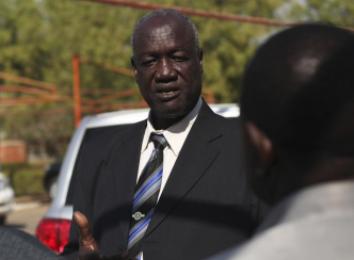S. Sudan may ask for Sudan’s help to secure oil fields: report
January 17, 2014 (JUBA) – South Sudan’s defence minister said on Friday that his government may ask Sudan for military assistance if the current conflict threatens the young nation’s oil fields, Reuters reported.

“Until now we have not asked the Sudan government to send in their forces” to protect South Sudan’s oil fields, the minister said.
“Should there be a threat, anything threatening the oil field, definitely the government of South Sudan may ask the Sudan government to come in and support,” he added.
Many members of staff at the oil fields have been evacuated since the fighting began and production has slipped from 245,000 barrels per day down to 200,000 bpd, leading to Juba asking Khartoum for engineers to address the decline and ensure production continues.
When the South seceded from Sudan in 2011 following decades of civil war, it took with it 75% of production, but still relies on its northern neighbour to export its crude.
UGANDAN MILITARY INTERVENTION
Also on Friday, The Citizen newspaper minister published a statement from defence minister admitting for the first time that Ugandan troops were helping the SPLA fight the rebellion as part of a memorandum of understanding with Kampala.
Both Juba and Kampala had originally denied that Ugandan troops were involved in offensive operations against the rebels, who are a mixture of defected soldiers and other armed groups.
The rebels in Jonglei have accused Uganda’s air force of carrying out attacks on their positions using helicopter gunships. The willingness of Uganda’s President Museveni to intervene in South Sudan’s five-week-old conflict has raised fears that other regional players may become involved militarily.
Despite Uganda being a leading player in the East African regional body that is mediating between the two sides in Addis Ababa, Museveni has threatened the rebels led by South Sudan’s former Vice President Riek Machar with “defeat”.
Defense minister Juuk, said in the statement that he was “appreciative of the Uganda parliament for approving the presence of its army in our country.”
He added that the presence of Ugandan troops (UPDF) was agreed as part of a “memorandum of understanding between the two countries to support the Sudan People’s Liberation Army against the rebels and help in securing the capital Juba.”
Juuk, who is a close ally of President Salva Kiir, said that the government expects more UPDF soldiers to be deployed in South Sudan.
The defence minister is the most senior government official to confirm that the Ugandan troops have been deployed not just to secure the capital Juba and key infrastructure such as the airport, but also to help the SPLA fight the rebellion.
The official said the deployment of the foreign forces was to help in the restoration of order, stressing that he would not also accept anybody to destroy what the administration had built.
“The independence of this country was gained after million lives were lost and we will [not] accept some people to take us back gain. If some people feel no shame in destroying what we have built, I will personally not accept the gains we made to be destroyed. I will not shy away from protecting what we have built”, he warned.
PEACE TALKS
Delegations representing the two sides have been in Addis Ababa to negotiate a ceasefire deal since the start of the month. One of the key rebel demands is that the Ugandan troops deployed in South Sudan cease supporting the SPLA’s combat operations.
Minister Juuk further told Reuters that the rebels, who are led by Machar, do not have adequate control over their fighters to make any ceasefire viable.
Negotiations have been ongoing since the beginning of January to end the conflict that began after members of the Presidential Guard clashed on the night of December 15. Since then significant parts of the army have defected in Jonglei, Unity and Upper Nile states.
Juuk said that fighting over Bor – the capital of Jonglei state – and Bentiu – the capital of Unity state was ongoing. The SPLA said on Friday that it is launching a counter-offensive to retake Malakal, the capital of Upper Nile state from the rebels.
Revenues from the oil fields in Unity and Upper Nile provide the Juba government with over 90% of its income. Sudan also relies upon the transit fees the south pays to export its crude to international markets through its pipelines and refineries.
South Sudan’s defence minister told Reuters that Machar, who is leading the rebellion against President Salva Kiir’s government has used, Dak Kueth, a spiritual leader from Jonglei state to encourage people to fight.
Juuk, a former governor of Jonglei state, said that Machar, who Kiir sacked in July, “is not in control of these people. So even if a peace agreement is signed, or cessation of hostilities, these people who are not under the control of Machar will continue creating insecurity for the people and government.”
“We cannot make a unilateral ceasefire” Juuk said, because the rebels “are attacking the civil population and government positions.”
According to the United Nations, about half a million people have been displaced by the conflict and over 1,000 people killed. The International Crisis Group think tank estimates that the number of dead could be close to 10,000.
Both sides have committed “mass atrocities” according to the UN and a recent report released by the US-based Human Rights Watch.
(ST)
